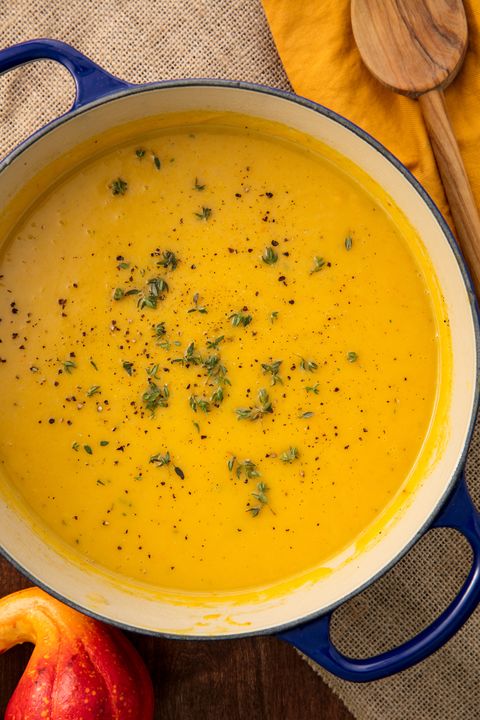Roasted Butternut Squash Soup
What dish is the most indicative of leaves falling and the chilly autumn breeze? Some might say its pumpkin pie, others might say warm apple cider, but to us, nothing fits better with sweater weather than a delicious bowl of butternut squash soup. The sweet, squashy and slightly earthy flavor that comes from a butternut squash is one of our go to tastes for cooking once the weather starts turning. What better way to get our butternut fix than with a heart soup? Fortunately for you, making it could not be easier.
Roast The Squash
The only downside of cooking with butternut squash is that it takes kinda forever. But once you take a bite of the sweet squash you remember why it's SO worth it. Roasting it before you make the soup is key to getting that caramelized, deeply sweet flavor in the squash that we all love. (Read this guide on how to roast the best butternut squash ever.)
With Potatoes—Or Not
We love adding a couple potatoes onto the sheet tray with the squash to give the soup an extra creamy texture and more body. But if you'd rather stay away from potatoes, that's totally fine. This soup will work without them!
You simply roast the squash with a couple diced potatoes until tender. (You can totally skip the potatoes but we love the starchy creaminess that they give the texture.) While those are roasting, you can start sautéing aromatics: onion, celery, and carrot. Then add your squash and potatoes and chicken broth and use an immersion blender to blend it up!
Build Your Base
Most good soup recipes start with you sautéing aromatics for flavor. This recipe calls for a classic mirepoix: onion, celery, and carrots that will give it a ton of flavor.
Add Your Herbs
We love thyme in this soup because—hello, fall!—but you can use whatever kind you want. Rosemary or sage would be delicious, but even Italian seasoning or dried oregano would work here, too.
Blend It Up
The conundrum of how to blend up a creamy soup is legit. An immersion blender makes it easiest. The stick blender allows you to just blend up the soup right in the pot! If you don't have one, you can also use a regular blender, just be sure to be careful when blending up the hot liquid (don't burn yourself!). We like to transfer it in batches so it's not so much liquid that the top of your blender flies off (scary, but true).
Slow Cook It
If you prefer to use a slow cooker you could put the raw squash and potatoes in with the other ingredients and cook on low for 6-8 hours or high for 2-3 hours. Once the squash is tender, blend with your immersion blender and serve!
Save Leftovers
Leftovers can be kept in an airtight container in the fridge for 5 days and in the freezer for up to 3 months! Also, don't judge use, but we think this soup is absolutely awesome sipped cold right out of the tupperware.
If you like this soup even half as much as we did, let us know in the comments below!
Editor's Note: The introduction to this recipe was updated on September 10, 2021 to include more information about the dish.
Made this? Let us know how it went in the comment section below!
large butternut squash, peeled and cubed (seeds removed)
potatoes, peeled and chopped
extra-virgin olive oil
Kosher salt
Freshly ground black pepper
butter
onion, chopped
stalk celery, thinly sliced
large carrot, chopped
fresh thyme, plus more for garnish
low-sodium chicken broth
- Preheat oven to 400º. On a large baking sheet, toss butternut squash and potatoes with 2 tablespoons olive oil and season generously with salt and pepper. Roast until tender, 25 minutes.
- Meanwhile, in a large pot over medium heat, melt butter and remaining tablespoon olive oil. Add onion, celery, and carrot and cook until softened, 7 to 10 minutes. Season generously with salt, pepper, and thyme.
- Add roasted squash and potatoes and pour over chicken broth. Simmer 10 minutes, then using an immersion blender, blend soup until creamy. (Alternately, carefully transfer batches of the hot soup to a blender.)
- Serve garnished with thyme.
Nutrition (per serving): 369 calories, 10 g protein, 55 g carbohydrates, 8 g fiber, 9 g sugar, 15 g fat, 4 g saturated fat, 491 mg sodium



















